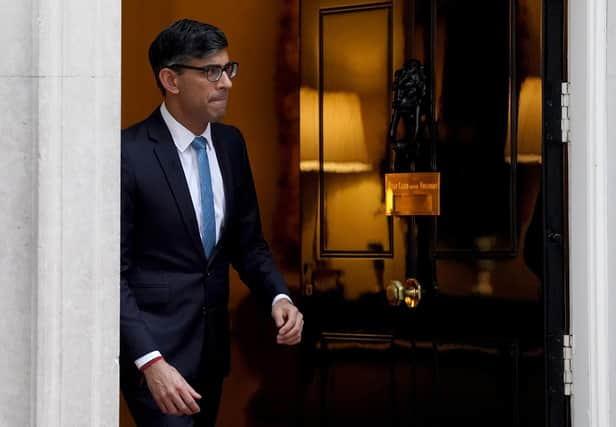Euan McColm: Why moving even further to the right can only hurt the Conservatives


The ability of the political ideologue to treat rejection as encouragement is quite extraordinary.
We saw this weird phenomenon in 2019 when followers of former Labour leader Jeremy Corbyn argued that their party’s crushing defeat at the hands of the Conservatives was down to its failure to fully embrace a hard left position.
Advertisement
Hide AdAdvertisement
Hide AdLogic be damned. Their argument was that voters who wanted a truly left-wing politics had felt so let down by Labour that they’d offered their support to then Prime Minister Boris Johnson. Of course, that doesn’t make sense but the true believer doesn’t require his argument to add up.
Now it’s the turn of Tory ideologues to claim a lack of purity has cost their party dear.
Labour’s convincing victories, last week, in both the Kingswood and Wellingborough by-elections have added mass to the cloud of doom hanging over the head of Prime Minister Rishi Sunak.
But while common sense should tell Tories that their priority should be trying to win back those who now wish to see Labour’s Sir Keir Starmer in Downing Street, an outspoken faction has other ideas.
Decent showings for Reform UK - honorary president former UKIP leader and Brexiteer Nigel Farage - have emboldened some to claim that, actually, if the Tories want to find their way back to electoral viability, the party should move further right.
In the early hours of Friday morning, after the by-election votes had been counted, former Tory cabinet minister Jacob Rees-Mogg insisted his party had to focus on appealing to voters who’d defected to Reform. Farage, who has made a habit of turning up at Conservative events in recent months, later told the BBC that Tory members would pick him over Sunak if offered the choice.
Both men ignored the fact the results of the by-elections showed Labour making greater gains than Reform. That inconvenient truth only undermines their position and so it’s easier to pretend it doesn’t exist.
In the reality-based world, the Tories have haemorrhaged support while under the influence of the crank-right.
Advertisement
Hide AdAdvertisement
Hide AdYet, in the fantasies of Rees-Mogg and others, their party’s only mistake is not to be right wing enough.
Not for the first time in living memory, the Conservative Party finds itself at a crossroads, offering two wildly different routes forward. Members will have to choose whether they turn in the direction of the mainstream and try to win back those who’ve switched to Labour or whether they move further to the fringes in the hope that victory lies in pandering to the worst prejudices of the crank right.
A quarter of a century ago, still reeling from Tony Blair’s New Labour landslide victory of 1997, the Tories found themselves similarly conflicted. After opposition leader William Hague failed to restore Conservative fortunes in 2001, the party decided that what voters truly yearned for was the cold, right-wing ideology of Iain Duncan Smith.
And when - fancy that - polls soon made it clear IDS wasn’t the answer to the Tories’ woes, members replaced him with the equally unelectable Michael Howard.
It wasn’t until the Tories selected the relatively moderate David Cameron as their new leader in 2005 that the party’s fortunes began to look up.
The election of Cameron as leader saw the Tories change approach. Rather than continuing to push to the right in the forlorn hope that this would hurt Labour, the Tories began shifting back towards the centre ground, taking their fight to the government.
One senior Tory politician tells me there are concerns among some veterans that the party won’t learn the lessons of the early 2000s.
“If you talk to people who were on the frontline back then, you’ll find they’re astonished some people in the party might even be considering tacking right.
Advertisement
Hide AdAdvertisement
Hide Ad“Yes, Reform took votes last week but nothing like the number that Labour took. We’re not going to win by chasing Reform voters on the fringes. Our only chance of future success is to try to appeal to the people who switched to Labour.”
This seems a sensible take, to me. The cranks on the Tory right are people of the “never happy” variety. To them, pragmatism equals sell-out; any sign that a leader might be willing to compromise on major issues has them reaching for the salts.
Right now, it would appear inevitable that - after losing the coming general election - Rishi Sunak will be replaced by one of his party’s leading right-wingers. Front-runners for the job include Kemi Badenoch, Suella Braverman, and Priti Patel. Under the leadership of any of those MPs, the Tories will continue moving right. There will be recriminations about failing to send immigrants to Rwanda and calls for tougher action to “stop the boats”.
And while this stuff may play with a faction of the Conservative Party, it won’t help win back those who’ve gone to Labour. There is no voter out there who plans to vote for Starmer’s party because the Tories haven’t been tough enough on asylum seekers.
While the post-general election Tories bog themselves down in pointless arguments about policies rejected by the majority of voters, Labour will have space to get on with governing.
Eventually, the Conservatives will see sense and move back to the centre where there are votes to be won with solid policies on, for example, the provision of affordable housing. The question is how long it will take the Tories to realise that its current obsessions are, in large part, to blame for its falling fortunes.
The Conservative Party stands at a crossroads. One route heads towards the centre ground and the battle with Labour, the other veers right towards prolonged irrelevance.
Who would bet against the party choosing the wrong path?
Comments
Want to join the conversation? Please or to comment on this article.